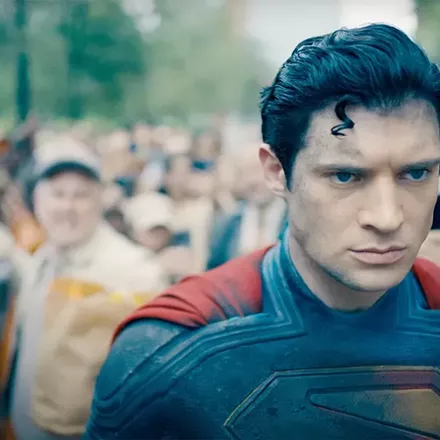Back to Brokeback
Revisiting Brokeback Mountain on its 20th anniversary, to find if it's still the best movie of 2005.
By Scott Renshaw @scottrenshawOn the evening of March 5, 2006, it felt like the improbable was about to happen: My favorite movie of the year was going to win Best Picture at the Academy Awards. Brokeback Mountain had already won three awards—Original Score for Gustavo Santaolalla's plaintive guitar, Adapted Screenplay for Larry McMurtry and Diana Ossana's work on Annie Proulx's short story and Director for Ang Lee—all of which pointed towards a Best Picture win. Then presenter Jack Nicholson announced the winner as Paul Haggis' strident "racism is bad, m'kay" drama Crash, followed by a "betcha didn't see that coming" gesture and a mouthed "whoah," and ... yes, "whoah" indeed.
Earlier this year, I had a vague plan to re-visit my Top 10 list from 2005, as well as other generally well-regarded films from that year, to see if I might find anything changing in where I would rank things. Hectic scheduling prevented pursuing that project in earnest, but revisiting Brokeback Mountain felt like a must, even before the announcement of a theatrical re-release to celebrate that anniversary (beginning June 20). There was some anxiety surrounding that prospect, since I hadn't actually watched it in its entirety since 2005, and it's hard not to wonder if something that struck me as so monumental at the time—and the obvious Best Picture of the year, Crash's golden statuette be damned—would age well. Would it reveal itself as a timeless classic? Or would it reveal me as a well-meaning straight progressive eager to champion a contemplative, heartbreaking queer love story?
Thus I returned to the world of 1963 Wyoming, and the summer in which Ennis Del Mar (Heath Ledger) and Jack Twist (Jake Gyllenhaal) connect while herding sheep in the mountains, beginning an affair that would last for 15 years and through their respective marriages. Much of what I remembered from my initial viewing remained intact, specifically the magnificent pacing of the first act in which Ennis and Jack meet and fall for one another while working alone—or at least mostly alone, save for the occasional bear and an awkward visit from their employer (Randy Quaid). There was also the tangled exploration of masculinity which in 2005 might have seemed part of another age, but continues to stick out its chest in the conservative dudeosphere; it's hard not to see scenes in which either man lashes out in anger as a way to prove that they're still manly men.
Yet I also found myself fascinated by new discoveries, particularly the ways in which Ennis and Jack are different. While Ennis clearly seems emotionally tied to Jack specifically, we see that Jack engages in other affairs with men—certainly with a street hustler he picks up in Tijuana, though also (it's heavily implied) with a family friend played by a young David Harbour. As a result, their relationship takes on a more complicated shape, as it's clear that while Jack definitely is attracted to men in general, Ennis' feelings could be much more driven by the loneliness revealed in the story of his tragic family history. It's a subtle recognition on the part of Proulx and the screenwriters about the spectrum of both sexual attraction and emotional need.
Perhaps just as heartbreaking as the central relationship, though, is the way Brokeback Mountain reveals the ripple effects of repression on the lives touched by these two men. We see much more of the disintegration of Ennis' marriage to Alma (Michelle Williams) and its effect on their two daughters, as well as Ennis' later relationship with a diner waitress (Linda Cardellini). The fear Ennis expresses early on about any prospect of a life with Jack—the result of witnessing an anti-gay hate crime in his childhood—turns into a marriage that has no chance at being anything but curdled by what he gives up. And the closest he gets to his oldest daughter (played as an adult by Kate Mara) is when supporting her own marriage because it represents a kind of love he couldn't have.
Period pieces often have an advantage in terms of aging gracefully, because they're not necessarily of their moment. Brokeback Mountain still feels vital, even if animosity is currently directed more at gender-non-conforming people. It's still powerful to watch the shock waves of pain caused by people being denied the ability to live authentically. And it's still the movie I wish had taken home one more gold statuette 20 years ago.
More by Scott Renshaw
-
Movie reviews: Eddington, Don't Let's Go to the Dogs Tonight, Smurfs
Three new movies in theaters for July 2025.
- Jul 16, 2025
-
July Weekend Festivals Roundup
Ogden Arts Festival, Draper Days, Utah County Lantern Festival, American Fork Steel Days and more.
- Jul 16, 2025
-
Film Reviews: New Releases for July 11
Superman, Abraham's Boys, Sovereign, Kill the Jockey
- Jul 10, 2025
- More »
Latest in Film Reviews
Readers also liked…
-
Sundance 2025 wrap-up plus February special screenings
Uncertainty about the future location shifts focus away from the movies
- Feb 5, 2025










